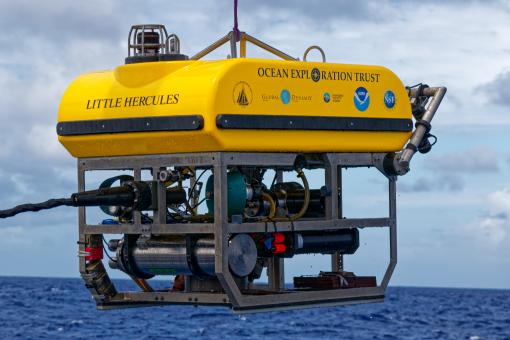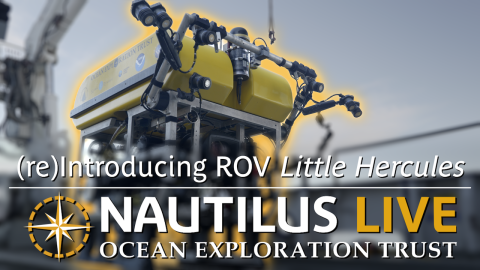ROV Little Hercules

The ROV Little Hercules is a smaller sister to Hercules, designed to function similarly, in a dual-body system with Argus or Atalanta, but with a focus on gathering high-quality video imagery. Little Hercules is equipped with a 4k video camera, LED lights, and basic sensors for navigation and situational awareness. Little Hercules was originally built in 2000 and was extensively refurbished and upgraded to 6,000-meter capability in 2019.
Science & Tech
Ocean exploration is a dynamic balance of understanding science and using the best in underwater technology.
Expeditions
Get a sneak peek of where we're headed next or revisit the discoveries of our past expeditions.
Classroom Resources
OET hosts a suite of free educational materials for use in classrooms, at home, or in the community.
ROV Little Hercules At-a-Glance
General
- 6,000 meters (19,685 feet)
- 30–45 meters (98.4–147.6 feet), 20 millimeters (0.79 inches) diameter, neutrally buoyant
- 1.4 meters long × 1.0 meters wide × 1.2 meters tall
- 400 kilograms (900 pounds) in air. 100 lbs payload
- 2 knots
- 20–30 meters/minute, (65–98 feet/minute) max
- Four Tecnadyne Model 1020 thrusters for heading control
Imaging & Lighting
- MxD® SeaCam® 4k Camera from Deep Sea Power & Light
- Two mini utility cameras (fixed mounted) 480 line NTSC format
- Ten Deepsea Power and Light LED Spherelights
Vehicle Sensors & Navigation
- Lord Microstrain 3DM-GX5-25 Attitude and Heading Reference System (AHRS)
- Paroscientific Digiquartz 8CB series
- Valeport VA500 500Khz Altimeter
- Kongsberg Mesotech 1071 scanning sonar, 675 kHz, 1–200 meter (3–656 feet) range typical
Scientific Instrument Support
- 110 V 60 Hz AC, 24 VDC and 12 VDC power options
- RS-232 serial, Ethernet: 10/100/1,000 mbps links available
Remotely Operated Vehicle Positioning
The ROV systems are outfitted with an ultrashort baseline (USBL) navigation system compatible with the operational platform and scientific requirements.
- Sonardyne Ranger II or TrackLink 5000

